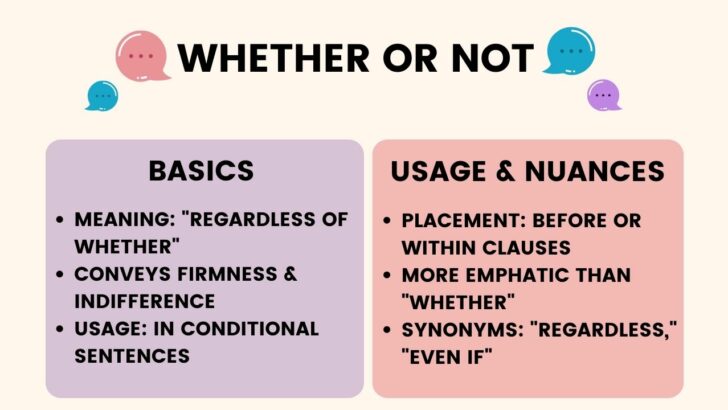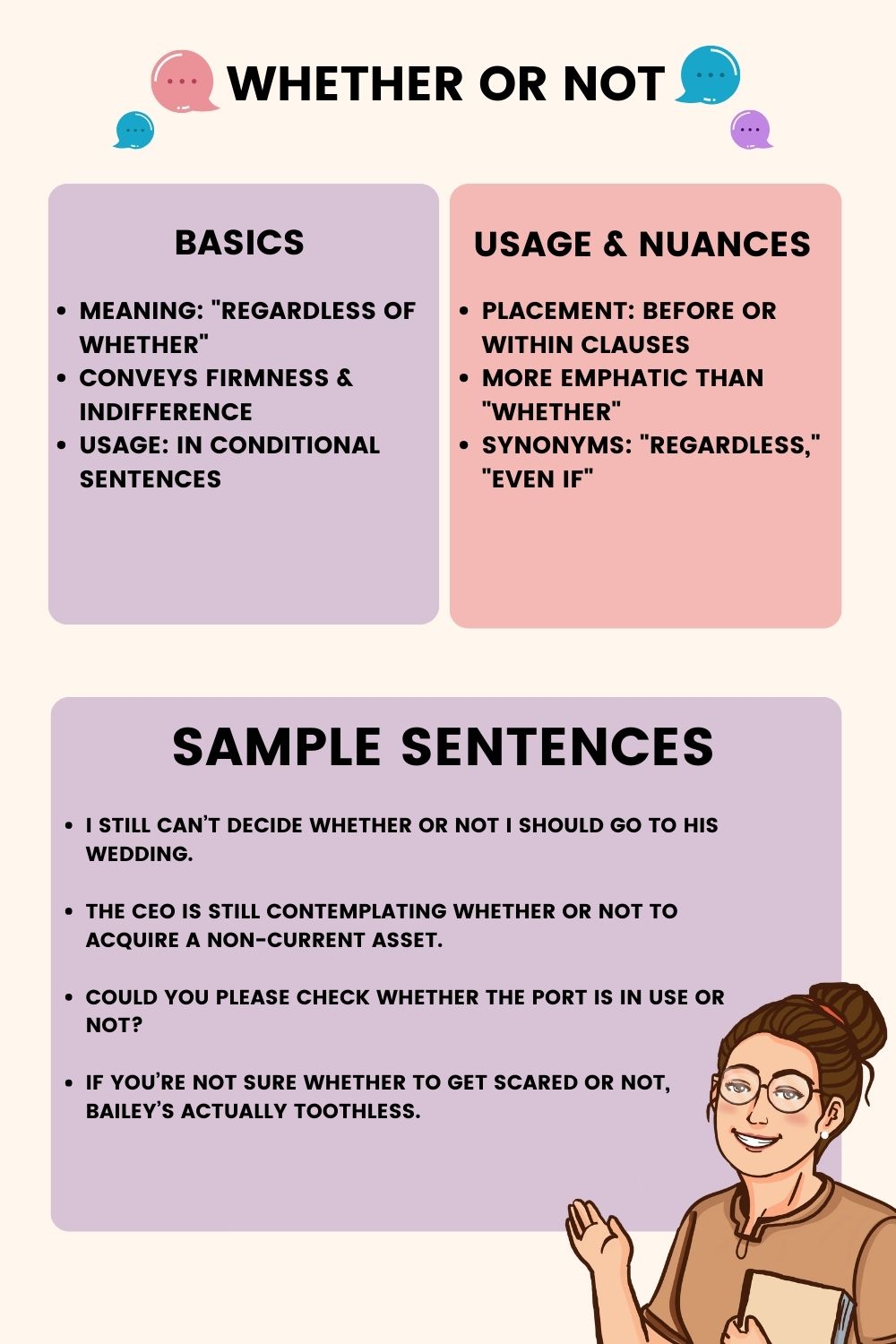How does “whether or not” work in the real world? How about its grammar? Do you know how to use it correctly and what other synonyms you can use out there?
If you answered “no” to all the questions above, we made this article just for you.
Let’s dig right in, whether you’re ready or not.
What is the meaning of “whether or not”?
How to use “whether or not” in a sentence
“Whether or not” Example Sentences
“Whether or not” synonyms
“Whether or not” vs. “Whether” difference
Frequently Asked Questions on “Whether or not”
What is the meaning of “whether or not”?
The meaning of “whether or not” is “regardless of whether,” along with an implied “you like it or not.” Often used to suggest firmness of decision, this phrase is a subordinating conjunction in conditional sentences that conveys indifference.
It is used to introduce two possible outcomes or options, and you don’t necessarily care about any of the two.
It can also be treated as a shorthand for “regardless of whether you like it or not.” You can use it when you feel like you want to show that you are firm or even “stubborn” with your decision.
Example:
It is also often used in the tail end of “regardless of whether or not” – an even more emphatic expression that’s a bit on the advanced side.
The next sentence is more of a polite way of saying “You can like or dislike the movie; despite that, I’m watching it.”
Example:
You can also use “whether” without “or not” to express a question or investigation. Using “whether” alone means that the “or not” is already understood, and the emphasis is lessened.
Example:
You may also use “whether” and “or” together without “not” to say that you doubt either of the two choices. To use “whether or” the right way, you must present two options in your statement.
Example:
Now that you know the basics, let’s dig a bit deeper into sentence construction, which is more commonly known as “syntax” in language studies.
In case you haven’t heard of it, our beginner’s guide to syntax should help you figure it out, at least the hard facts.
How to use “whether or not” in a sentence
Knowing how to correctly use “whether or not” in a sentence could make you more convincing than others. It also creates more emphasis than using “whether” alone.
But, note that using “whether or not” could also make you sound more willful when compared to using “whether.” In cases where you use it wrongly, you could come off as demanding.
To use “whether or not” in a sentence, remember the next two cases.
Use “whether or not” before a phrase or clause
The first way is to use “whether or not” before a prepositional phrase. It’s easy to recognize this prepositional phrase because it often starts with “to.”
This also means “whether or not” likely goes in the middle of your sentence, as in the next examples. The pattern goes like this:
- [clause] + [whether or not] + [prepositional phrase]
Examples (before a phrase):
You can also use “whether or not” before a clause, meaning at the beginning of a dependent clause. The pattern goes like this:
- [clause] + [whether or not] + [clause]
Example (before a clause):
Alternatively, you may also invert the order of your clauses and start the sentence with “whether or not” instead. The pattern goes like this:
- [whether or not] + [clause] + [clause]
Example (before a clause, inverted):
Use “whether” and “or not” within a phrase or clause
The second way is to use “whether or not” within a phrase or clause, which means you‘ll have to move “or not” to or toward the end of your sentence.
In the following examples, “whether” comes before the prepositional phrase, and “or not” comes at the end. The pattern goes like this:
- [clause] + [whether] + [prepositional phrase] + [or not]
Examples (within a phrase):
Instead of using a phrase, you can also play around and use a “whether” and “or not” within a clause. The pattern goes like this:
- [clause] + [whether] + [clause] + [or not]
Examples (within a clause):
Alternatively, you can also invert your sentence and start with “whether” and “or not” surrounding the dependent clause, and the main clause comes after. The pattern goes like this:
- [whether] + [clause] + [or not] + [clause]
Examples (within a clause, inverted):
While we can set rules on how to use certain English words and phrases, the truth is it is indeed confusing to use them in real life. This is why many people are asking about how to use “whether or not” in a sentence.
To practice, why don’t we take a closer look at more examples of using “whether or not” in a sentence?
“Whether or not” Example Sentences
Here are several more example sentences of how to use “whether or not” in a sentence:
- I still can’t decide whether or not I should go to his wedding.
- The CEO is still contemplating whether or not to acquire a non-current asset.
- Could you please check whether the port is in use or not?
- If you’re not sure whether to get scared or not, Bailey’s actually toothless.
- I think all women should be able to freely decide whether to get pregnant or not.
- Regardless of whether or not you believe in ghosts, you still shouldn’t say bad things about them.
- Whether you like it or not, I can’t let you drive this time.
“Whether or not” synonyms
If you think “whether or not” is still a bit hard to use, you can also choose other terms that mean the same – we call them synonyms.
“Whether or not” is a connective device we use to emphasize that something is inevitable despite certain conditions.
Here are some useful synonyms of “whether or not,” and feel free to use them in writing or speaking as needed.
Regardless
“Regardless” means “without regard to something,” making it a great synonym for “whether or not.” It, however sounds more formal than “whether or not”, so you should stick to using it in appropriate contexts.
Example:
Notwithstanding
“Notwithstanding” is another formal way of saying “whether or not,” but it is more often used to replace “nevertheless.” It suggests that no situation or condition would hinder one from doing something.
Example:
Irrespective of whether
“Irrespective of whether” is also a formal alternative to “whether or not,” and it is used to say that something is bound to happen no matter what the situation is.
Example:
Despite
“Despite” is more of a casual way to say “whether or not,” which makes it a handy expression to use. “Despite” is a preposition that also means “in spite of,” which means you need to use a noun phrase after it.
Example:
Even if
“Even if” is also a great alternative to “whether or not.” It is a conjunction to suggest that something is possible or considered despite hardships or unfavorable circumstances.
Example:
No matter
“No matter” is also a casual way to say “whether or not,” and it means that anything is unimportant or irrelevant in a particular case. This means your decision will not be affected by other circumstances.
Example:
No matter how busy he gets, he always makes time for his family.
In any case
“In any case” is also another great way of saying “whether or not.” It suggests the meaning “all things considered,” which helps emphasize that something is true or will happen despite any factors.
Example:
Certainly
“Certainly” is one easy and common way to say “whether or not.” Using this synonym conveys a more positive yet less emphatic connotation than “whether or not.”
Example:
Absolutely
You would also want to use ” Absolutely ” instead of “whether or not,” especially if you want to convey more positivity in your message. Use this one if you want to avoid coming off as stubborn.
Example:
We’ll absolutely go to your recital tonight, whether or not it rains.
Definitely
“Absolutely” is also a common and casual way of saying “whether or not.” Using “absolutely” also conveys more optimism, which means you can avoid problems if you choose this one.
Example:
“Whether or not” vs. “Whether” difference
There isn’t really that much of a difference when you choose “whether or not” or “whether” in your sentence, except for the emphasis each of them conveys.
“Whether or not” is more emphatic than “whether,” making it convey more firmness and determination than the latter.
So, when you use “whether or not,” it means you want to say that something must happen despite any challenges that may or may not arise.
Therefore, “whether or not” works better in situations that need you to be more persuasive with whatever you’re trying to say or achieve.
On the other hand, “whether” is a softer version you can use when you’re having a water cooler conversion with your colleague.
Read our article on the difference between whether or not and whether for a more in-depth discussion of the subject.
Frequently Asked Questions on “Whether or not”
What is the part of speech of “whether or not”?
“Whether or not” is a subordinating type of conjunction just like “whether.” It is used in conditional statements where there are two possible choices or outcomes, yet neither of them matters to the speaker or subject.
Should it be “whether or not” or “weather or not”?
To use the conjunction in writing, the correct spelling is “whether or not” and not “weather or not.” The confusion lies in the similarity of how “whether” and “weather” are pronounced. “Whether” is a conjunction, whereas “weather” is a noun.

Hey fellow Linguaholics! It’s me, Marcel. I am the proud owner of linguaholic.com. Languages have always been my passion and I have studied Linguistics, Computational Linguistics and Sinology at the University of Zurich. It is my utmost pleasure to share with all of you guys what I know about languages and linguistics in general.


